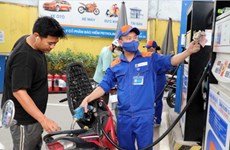Made-in-Vietnam oil rigs go overseas
Vietnamese engineers have worked to master advanced oil rig
construction technology and have now exported their giant oil platforms.
Vietnamese engineers have worked to master advanced oil rig
construction technology and have now exported their giant oil platforms.
The PetroVietnam Technical Services Corporation Mechanical and Construction (PTSC M&C) is planning to export the Marahaja Lela South oil rig to Brunei this June. The company earlier won the 100 million USD contract to build the oil rig from investor Total E&P Borneo BV, affiliated with France's Total Corporation.
PTSC M&C has completed the project's jacket in Brunei, weighing nearly 1,200 tonnes, and is working to complete the oil rig's topside, weighing nearly 3,000 tonnes, in the southern coastal province of Ba Ria-Vung Tau.
In 2013 the company also won a 70 million USD procurement and fabrication contract for the Heera Redevelopment – Process Platform project operated by India's Oil and Natural Gas Corporation. It was performed by PTSC M&C under a contract signed with Afcons, the main contractor of the project.
The company delivered the project's 8,500-tonne topside to its Indian partner in November, 2014.
At the delivery ceremony, K Subrahmanian, a representative from Afcons, said the platform was completed professionally, while maintaining international standards.
Director of PTSC M&C Company Dong Xuan Thang told Tuoi Tre (Youth) newspaper that the company had once hired foreign experts to work on detailed design stages, which led to an increase in total expenses.
But since 2009, the company set a target to complete the detailed design stage itself, to help avoid such hurdles, he said.
To that end, PTSC M&C initially invited international partners to train its engineers at the company's headquarters in southern Ba Ria-Vung Tau province. The Vietnamese and foreign engineers worked together on several projects, and the company reached its target one year earlier than expected.
The achievement was marked with its engineers completing the detailed design for the Su Tu Vang Tay Nam oil rig on their own in mid-2014.
Thang said the completion of detailed designs for oil rig construction projects by Vietnamese engineers brought in many profits, particularly economic efficiencies. It also helped to minimise project management staff and helped to save millions of dollars on each project, he said.
The use of local workforce also helped the company detect and fix any problems immediately, he added.
"The time to complete the jacket was thus shortened to only five months, instead of up to 11 months, and ten months from the previous 18 months in the case of the topside," he said.
"The loss ratio of the project also dropped to only 5 percent, instead of 20-25 percent."
While PTSC M&C is being praised for its efforts, the PetroVietnam Marine Shipyard Company (PV Shipyard) is also enjoying initial successes in its bid to master the leading-edge technology in building jackup rigs.
A jackup rig, or a self-elevating unit, is a type of mobile platform that consists of a buoyant hull fitted with a number of movable legs, and is capable of raising its hull over the surface of the sea, freeing it from reliance on tug boats or heavy lift ships for transportation.
In October, 2014, PV Shipyard started work on the first phase of the 230 million USD Tam Dao 05 jackup rig for Vietsovpetro, a joint Russian-Vietnamese enterprise. Construction is expected to be completed after 32 months. This is considered the largest and most modern self-elevating rig in Vietnam that was built wholly by Vietnamese engineers from detailed design through construction.
In early 2012, PV Shipyard also succeeded in building the Tam Dao 03 platform as part of a 190 million USD contract with Vietsovpetro. The platform was granted a certificate by the American Bureau of Shipping (ABS) for meeting international standards.
The event helped to list Vietnam among the few countries in the world that are able to manufacture such jackup rigs.-VNA
The PetroVietnam Technical Services Corporation Mechanical and Construction (PTSC M&C) is planning to export the Marahaja Lela South oil rig to Brunei this June. The company earlier won the 100 million USD contract to build the oil rig from investor Total E&P Borneo BV, affiliated with France's Total Corporation.
PTSC M&C has completed the project's jacket in Brunei, weighing nearly 1,200 tonnes, and is working to complete the oil rig's topside, weighing nearly 3,000 tonnes, in the southern coastal province of Ba Ria-Vung Tau.
In 2013 the company also won a 70 million USD procurement and fabrication contract for the Heera Redevelopment – Process Platform project operated by India's Oil and Natural Gas Corporation. It was performed by PTSC M&C under a contract signed with Afcons, the main contractor of the project.
The company delivered the project's 8,500-tonne topside to its Indian partner in November, 2014.
At the delivery ceremony, K Subrahmanian, a representative from Afcons, said the platform was completed professionally, while maintaining international standards.
Director of PTSC M&C Company Dong Xuan Thang told Tuoi Tre (Youth) newspaper that the company had once hired foreign experts to work on detailed design stages, which led to an increase in total expenses.
But since 2009, the company set a target to complete the detailed design stage itself, to help avoid such hurdles, he said.
To that end, PTSC M&C initially invited international partners to train its engineers at the company's headquarters in southern Ba Ria-Vung Tau province. The Vietnamese and foreign engineers worked together on several projects, and the company reached its target one year earlier than expected.
The achievement was marked with its engineers completing the detailed design for the Su Tu Vang Tay Nam oil rig on their own in mid-2014.
Thang said the completion of detailed designs for oil rig construction projects by Vietnamese engineers brought in many profits, particularly economic efficiencies. It also helped to minimise project management staff and helped to save millions of dollars on each project, he said.
The use of local workforce also helped the company detect and fix any problems immediately, he added.
"The time to complete the jacket was thus shortened to only five months, instead of up to 11 months, and ten months from the previous 18 months in the case of the topside," he said.
"The loss ratio of the project also dropped to only 5 percent, instead of 20-25 percent."
While PTSC M&C is being praised for its efforts, the PetroVietnam Marine Shipyard Company (PV Shipyard) is also enjoying initial successes in its bid to master the leading-edge technology in building jackup rigs.
A jackup rig, or a self-elevating unit, is a type of mobile platform that consists of a buoyant hull fitted with a number of movable legs, and is capable of raising its hull over the surface of the sea, freeing it from reliance on tug boats or heavy lift ships for transportation.
In October, 2014, PV Shipyard started work on the first phase of the 230 million USD Tam Dao 05 jackup rig for Vietsovpetro, a joint Russian-Vietnamese enterprise. Construction is expected to be completed after 32 months. This is considered the largest and most modern self-elevating rig in Vietnam that was built wholly by Vietnamese engineers from detailed design through construction.
In early 2012, PV Shipyard also succeeded in building the Tam Dao 03 platform as part of a 190 million USD contract with Vietsovpetro. The platform was granted a certificate by the American Bureau of Shipping (ABS) for meeting international standards.
The event helped to list Vietnam among the few countries in the world that are able to manufacture such jackup rigs.-VNA












